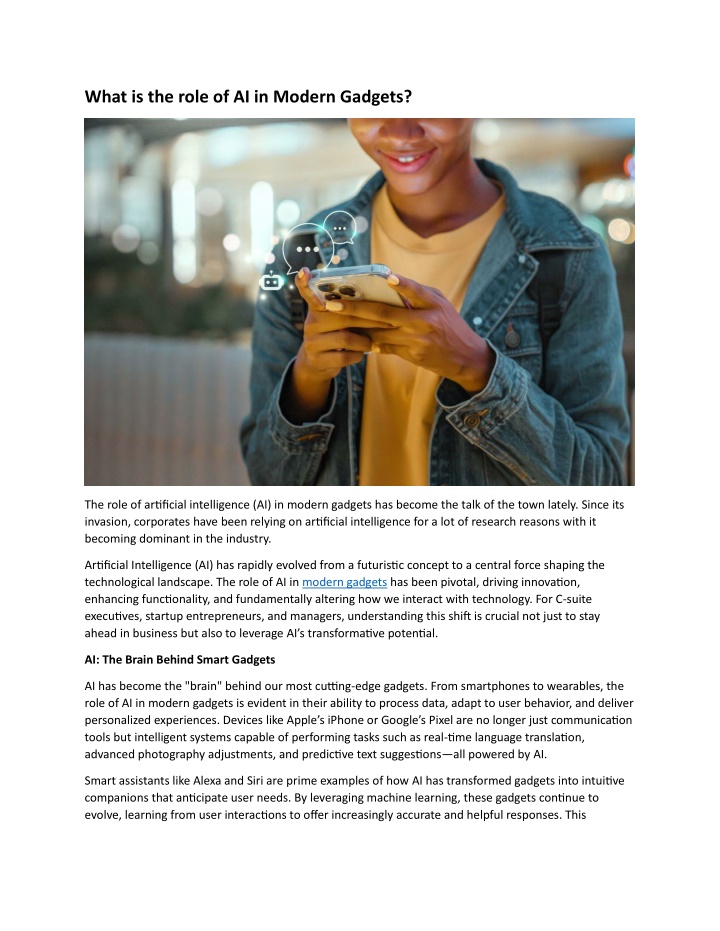
What is the role of AI in Modern Gadgets
Explore the transformative role of AI in modern gadgets, from smart assistants and wearables to IoT and healthcare, driving innovation and enhancing daily life.
Download Presentation

Please find below an Image/Link to download the presentation.
The content on the website is provided AS IS for your information and personal use only. It may not be sold, licensed, or shared on other websites without obtaining consent from the author. If you encounter any issues during the download, it is possible that the publisher has removed the file from their server.
You are allowed to download the files provided on this website for personal or commercial use, subject to the condition that they are used lawfully. All files are the property of their respective owners.
The content on the website is provided AS IS for your information and personal use only. It may not be sold, licensed, or shared on other websites without obtaining consent from the author.
E N D
Presentation Transcript
What is the role of AI in Modern Gadgets? The role of artificial intelligence (AI) in modern gadgets has become the talk of the town lately. Since its invasion, corporates have been relying on artificial intelligence for a lot of research reasons with it becoming dominant in the industry. Artificial Intelligence (AI) has rapidly evolved from a futuristic concept to a central force shaping the technological landscape. The role of AI inmodern gadgetshas been pivotal, driving innovation, enhancing functionality, and fundamentally altering how we interact with technology. For C-suite executives, startup entrepreneurs, and managers, understanding this shift is crucial not just to stay ahead in business but also to leverage AI s transformative potential. AI: The Brain Behind Smart Gadgets AI has become the "brain" behind our most cutting-edge gadgets. From smartphones to wearables, the role of AI in modern gadgets is evident in their ability to process data, adapt to user behavior, and deliver personalized experiences. Devices like Apple s iPhone or Google s Pixel are no longer just communication tools but intelligent systems capable of performing tasks such as real-time language translation, advanced photography adjustments, and predictive text suggestions all powered by AI. Smart assistants like Alexa and Siri are prime examples of how AI has transformed gadgets into intuitive companions that anticipate user needs. By leveraging machine learning, these gadgets continue to evolve, learning from user interactions to offer increasingly accurate and helpful responses. This
intelligence is also embedded in smart TVs, home security systems, and even kitchen appliances, making AI an integral part of modern life. Enhancing Efficiency and Convenience One of the key aspects of the role of AI in modern gadgets is the way it enhances efficiency and convenience. AI-powered voice assistants like Amazon Alexa, Google Assistant, and Apple s Siri have revolutionized how users interact with their devices. These assistants enable hands-free operation, smart home management, and even proactive reminders based on user habits. Similarly, AI algorithms in gadgets like smart thermostats optimize energy consumption by learning household routines, making them both environmentally friendly and cost-effective. Moreover, AI in navigation systems has significantly improved travel experiences. Whether it s suggesting the fastest route, avoiding traffic, or predicting potential hazards, AI is ensuring smoother commutes and safer journeys. In retail, AI-powered gadgets such as smart mirrors and virtual assistants are reshaping how customers shop, blending the physical and digital worlds seamlessly. Revolutionizing Healthcare Through Wearables Healthcare is another domain where the role of AI in modern gadgets is making a profound impact. Wearables such as Fitbit, Garmin, and Apple Watch are now equipped with AI-driven features that monitor heart rates, track sleep patterns, and even detect irregularities like atrial fibrillation. These gadgets are empowering individuals to take charge of their health while providing healthcare professionals with critical data for diagnostics and treatment.
AI-powered gadgets are also facilitating telemedicine by enabling remote patient monitoring. For instance, devices equipped with AI can alert physicians to abnormal patterns in real-time, ensuring timely interventions. The integration of AI into medical gadgets is not only improving patient outcomes but also reducing the burden on healthcare systems. AI and the Internet of Things (IoT) The role of AI in modern gadgets becomes even more significant when paired with the Internet of Things (IoT). IoT devices, from smart refrigerators to security systems, rely on AI to process massive amounts of data and make intelligent decisions in real-time. For example, AI-enabled security cameras can distinguish between a potential intruder and a harmless passerby, reducing false alarms and improving home security. In industrial settings, AI and IoT are revolutionizing operations through predictive maintenance. Smart sensors in machinery can detect potential faults before they occur, minimizing downtime and saving costs. This synergy between AI and IoT is setting new standards for efficiency and reliability across industries. Transforming Entertainment and Media In the entertainment sector, the role of AI in modern gadgets has been revolutionary. Streaming platforms likeNetflixand Spotify use AI algorithms to curate personalized content recommendations, keeping users engaged and satisfied. Similarly, AI is enhancing gaming experiences with non-player characters (NPCs) that adapt to players actions, creating more immersive and dynamic gameplay.
AI-powered virtual reality (VR) and augmented reality (AR) gadgets are also redefining entertainment. From creating realistic simulations for gaming to enhancing cinematic experiences, these technologies are pushing the boundaries of what s possible. The ability of AI to adapt content to user preferences ensures a more engaging and personalized experience. Challenges in AI-Powered Gadgets While the role of AI in modern gadgets is undeniably transformative, it also presents challenges. Privacy and data security remain significant concerns. Gadgets powered by AI collect and process vast amounts of user data, which can be vulnerable to breaches if not adequately protected. Additionally, the ethical implications of AI decision-making and the potential for bias in algorithms are issues that manufacturers and businesses must address. Another challenge is the rapid pace of technological advancement, which can render gadgets obsolete quickly. Businesses must strike a balance between innovation and sustainability, ensuring that AI- powered gadgets remain relevant and environmentally friendly. Business Implications for Leaders For C-suite executives, startup founders, and managers, the role of AI in modern gadgets offers both opportunities and imperatives. Businesses must consider integrating AI into their product offerings to remain competitive in a market where consumers increasingly expect smart, adaptive technologies. At the same time, fostering partnerships with AI innovators and investing in talent capable of developing these technologies are strategic priorities for sustained growth. Leaders must also navigate the regulatory landscape surrounding AI. Ensuring compliance with data protection laws and addressing ethical concerns are critical to building trust with consumers and stakeholders. The Future: AI in Emerging Gadgets
Looking ahead, the role of AI in modern gadgets will continue to expand.Autonomous vehicles, augmented reality glasses, and AI-driven robotics are just the beginning of what s possible. The convergence of AI with other technologies like 5G and edge computing will further enhance the capabilities of modern gadgets, making them faster, more reliable, and even more integral to our daily lives. Additionally, AI s integration with renewable energy solutions is expected to lead to smarter and more efficient gadgets. Solar-powered AI devices and gadgets optimized for energy conservation will play a significant role in addressing environmental concerns. Conclusion The role of AI in modern gadgets is a defining characteristic of our era, reshaping industries, lifestyles, and expectations. From optimizing everyday tasks to driving groundbreaking innovations, AI s influence on technology is profound and far-reaching. For leaders in the business world, recognizing and harnessing this trend is essential to thrive in an increasingly AI-driven marketplace. As gadgets become smarter and more interconnected, the role of AI will only grow, paving the way for a future where technology is more intuitive, responsive, and transformative than ever before. Uncover the latest trends and insights with our articles onVisionary Vogues






















